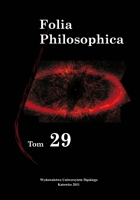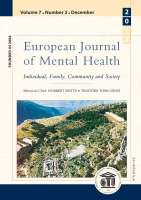
O naturalnym pragnieniu doskonałości uszczęśliwiającej* (Przekład: Aleksander R. Bańka, Jacek Surzyn)
Joseph Maréchal, translations, On natural desire of perfection that makes happy (Translation: Aleksander R. Bańka, Jacek Surzyn)
More...We kindly inform you that, as long as the subject affiliation of our 300.000+ articles is in progress, you might get unsufficient or no results on your third level or second level search. In this case, please broaden your search criteria.

Joseph Maréchal, translations, On natural desire of perfection that makes happy (Translation: Aleksander R. Bańka, Jacek Surzyn)
More...
The paper deals with Eugen Fink’s interpretation of transcendental I. Fink does not make do with traditional phenomenological distinction between natural I and transcendental I, but within transcendental I he looks for the distinction between constitutive I (konstituierendes Ich) i phenomenologizing I. Hence, according to Fink, we should distinguish three kinds of I: natural I (trapped in the world), transcendental I which constitutes the world and transcendental-phenomenologizing I (transzendental-phänomenologisierendes Ich) as theoretical spectator, who meets the conditions of phenomenological reduction but does not contribute to the constitution of the world. Finks interpretation of transcendental I aims at overcoming difficulties related to Husserlian phenomenological reduction, and the distinction of constitutive I and phenomenologizing I was accepted by Husserl himself.
More...
Review: Christina H. Tarnopolska: Prudes, Perverts, and Tyrants: Plato’s „Gorgias” and the Politics of Shame, Princeton 2010
More...
The aim of the paper is to investigate into the relations between basic moral categories, namely those of norms, ideals and supererogation. I discuss, firstly, the ways of understanding these categories, secondly, how moral acting can be described using them and thirdly, how they relate within certain moral system. Yet, what is of a special importance is the relation between norms and ideals and their complementary character. For it might be argued that omission of one these categories may lead to posing important limitations on the possibilities of grasping certain moral issue adequately (on a descriptive level) and setting the full range of possible solutions (on normative level). Hence, I argue that to resign from two-level form of moral analysis may lead to the atrophy of the very idea of ethics itself.
More...
Jean Héring Some tasks of the phenomenology of dream (translation: Marta Ples)
More...
Review: Bogdan Dembiński "Późny Platon i Stara Akademia" , Kęty 2010
More...
"Philosophy as a system" Review: Ch. Krijnen "Philosophie als System Prinzipientheoretische Untersuchungen zum Systemgedanken bei Hegel, im Neukantianismus und in der Gegenwartsphilosophie, Würzburg 2008
More...











In this essay, we combine literature on economics and social sciences, inducing practical experiences and philosophically and theologically inspired praxis. We give our perceptions of the recent fi nancial-economic crisis and the ‘free market’- economy and of some consequences in the private domain. As therapists we have to refl ect on contemporary issues of interrelatedness of social-economic facts and narratives with (inter)personal dimensions. How about the conditions for relational responsibility in the midst of social injustice and instability, hidden behind ideologies of autonomy and equality? Against this background as ‘heuristics of fear’, we search for a realistic perspective of hope. The strength of relational ethics can be seen as an illusion, when we would assume that being responsible is dependent on the extent of freedom which nature and culture give us. Although this assumption is familiar, relational ethics still are the motivational layer in which hope resides for repairing the hurt human justice. Reading Levinas helps us to understand how this is possible. The appeal of another person motivates me. His/her ‘command without force’ makes me free. In the contextual approach of Boszormenyi-Nagy, there still are valuable stepping stones to be found for resourcing the sense of responsible relational caring.
More...